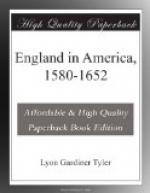In April, 1623, Alderman Robert Johnson, deputy to Sir Thomas Smith during the time of his government, brought a petition to the king for the appointment of a commission in England to inquire into the condition of the colony, which he declared was in danger of destruction by reason of “dissensions among ourselves and the massacre and hostility of the natives.” This petition was followed by a scandalous paper, called The Unmasking of Virginia, presented to the king by another tool of Count Gondomar, one Captain Nathaniel Butler.[24] The company had already offended the king, and these new developments afforded him all the excuse that he wanted for taking extreme measures. He first attempted to cow the company into a “voluntary” surrender by seizing their books and arresting their leading members. When this did not avail, the Privy Council, November 3, 1623, appointed a commission to proceed to Virginia and make a report upon which judicial proceedings might be had. The company fought desperately, and in April, 1624, appealed to Parliament, but King James forbade the Commons to interfere.
In June, 1624, the expected paper from Virginia came to hand, and the cause was argued the same month at Trinity term on a writ of quo warranto before Chief-Justice James Ley of the King’s Bench. The legal status of the company was unfavorable, for it was in a hopeless tangle, and the death record in the colony was an appalling fact. When, therefore, the attorney-general, Coventry, attacked the company for mismanagement, even an impartial tribune might have quashed the charter. But the case was not permitted to be decided on its merits. The company made a mistake in pleading, which was taken advantage of by Coventry, and on this ground the patent was voided the last day of the term (June 16, 1624).[25]
Thus perished the great London Company, which in settling Virginia expended upward of L200,000 (equal to $5,000,000 in present currency) and sent more than fourteen thousand emigrants. It received back from Virginia but a small part of the money it invested, and of all the emigrants whom it sent over, and their children, only one thousand two hundred and twenty-seven survived the charter. The heavy cost of the settlement was not a loss, for it secured to England a fifth kingdom




